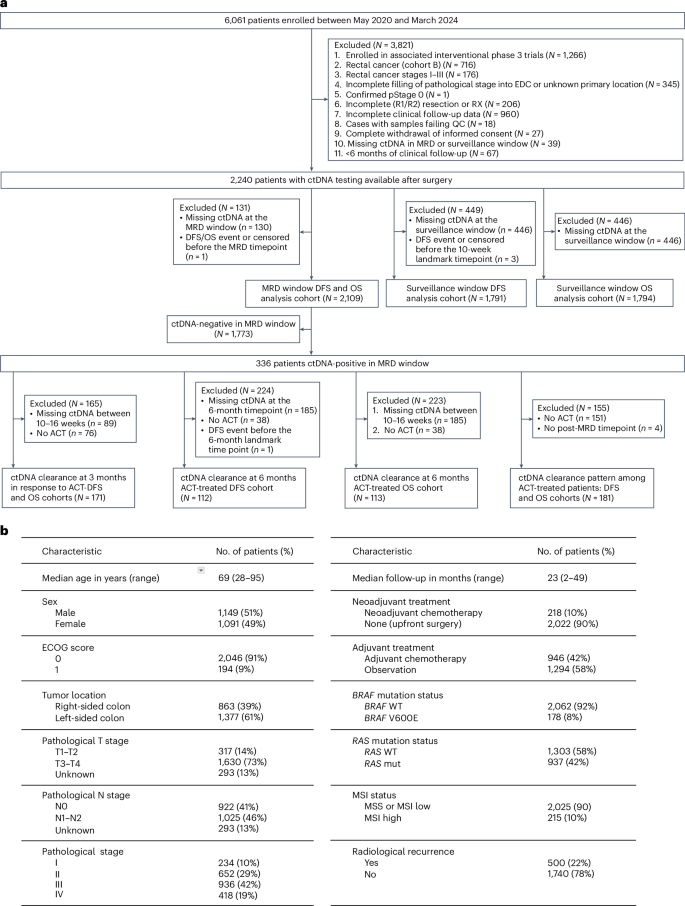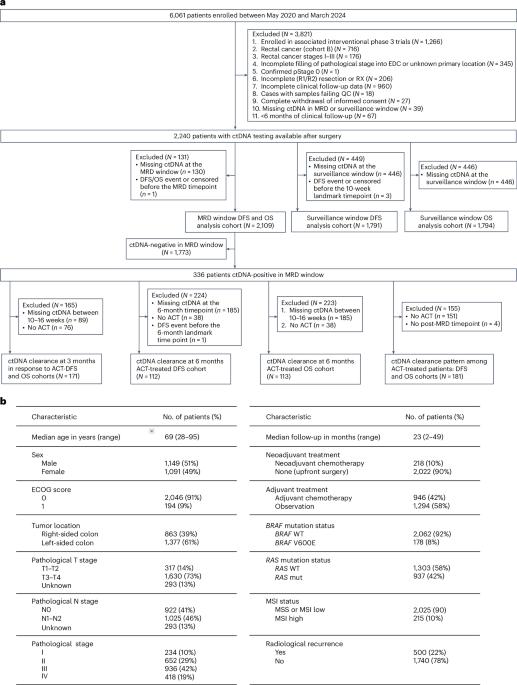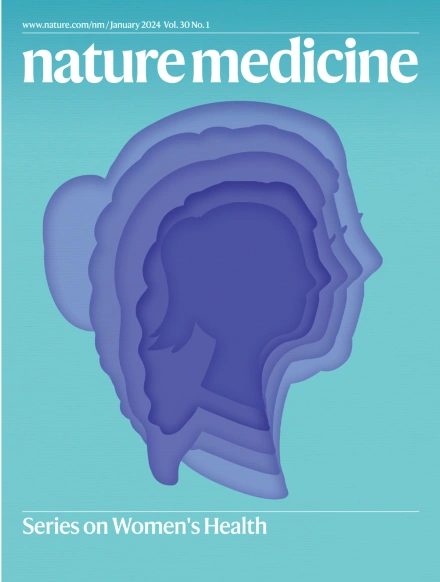ctDNA-based molecular residual disease and survival in resectable colorectal cancer
IF 58.7
1区 医学
Q1 BIOCHEMISTRY & MOLECULAR BIOLOGY
引用次数: 0
Abstract
The interim analysis of the CIRCULATE-Japan GALAXY observational study demonstrated the association of circulating tumor DNA (ctDNA)-based molecular residual disease (MRD) detection with recurrence risk and benefit from adjuvant chemotherapy (ACT) in resectable colorectal cancer (CRC). This updated analysis with a 23-month median follow-up, including 2,240 patients with stage II–III colon cancer or stage IV CRC, reinforces the prognostic value of ctDNA positivity during the MRD window with significantly inferior disease-free survival (DFS; hazard ratio (HR): 11.99, P < 0.0001) and overall survival (OS; HR: 9.68, P < 0.0001). In patients who experienced recurrence, ctDNA positivity correlated with shorter OS (HR: 2.71, P < 0.0001). The significantly shorter DFS in MRD-positive patients was consistent across actionable biomarker subsets. Sustained ctDNA clearance in response to ACT was an indicator of favorable DFS and OS compared to transient clearance (24-month DFS: 89.0% versus 3.3%; 24-month OS: 100.0% versus 82.3%). True spontaneous clearance rate with no clinical recurrence was 1.9% (2/105). Overall, our findings provide evidence for the utility of ctDNA monitoring for post-resection recurrence and mortality risk stratification that could be used for guiding adjuvant therapy. In a large cohort with a 23-month median follow-up of the CIRCULATE-Japan GALAXY observational study, ctDNA-based detection of molecular residual disease was predictive of survival outcomes and benefit of adjuvant chemotherapy in patients with resectable colorectal cancer.


基于ctDNA的可切除结直肠癌分子残留病和生存率
CIRCULATE-Japan GALAXY 观察性研究的中期分析表明,基于循环肿瘤 DNA (ctDNA) 的分子残留病 (MRD) 检测与可切除结直肠癌 (CRC) 的复发风险和辅助化疗 (ACT) 的获益有关。这项最新分析的中位随访时间为23个月,包括2240名II-III期结肠癌或IV期CRC患者,它加强了MRD窗口期ctDNA阳性的预后价值,无病生存期(DFS;危险比(HR):11.99,P< 0.0001)和总生存期(OS;HR:9.68,P< 0.0001)均显著降低。在复发患者中,ctDNA阳性与较短的OS相关(HR:2.71,P< 0.0001)。MRD 阳性患者的 DFS 明显较短,这在可操作生物标志物亚群中是一致的。与瞬时清除相比,ctDNA对ACT反应的持续清除是一个有利的DFS和OS指标(24个月DFS:89.0%对3.3%;24个月OS:100.0%对82.3%)。无临床复发的真正自发清除率为 1.9%(2/105)。总之,我们的研究结果为ctDNA监测用于切除术后复发和死亡风险分层提供了证据,可用于指导辅助治疗。
本文章由计算机程序翻译,如有差异,请以英文原文为准。
求助全文
约1分钟内获得全文
求助全文
来源期刊

Nature Medicine
医学-生化与分子生物学
CiteScore
100.90
自引率
0.70%
发文量
525
审稿时长
1 months
期刊介绍:
Nature Medicine is a monthly journal publishing original peer-reviewed research in all areas of medicine. The publication focuses on originality, timeliness, interdisciplinary interest, and the impact on improving human health. In addition to research articles, Nature Medicine also publishes commissioned content such as News, Reviews, and Perspectives. This content aims to provide context for the latest advances in translational and clinical research, reaching a wide audience of M.D. and Ph.D. readers. All editorial decisions for the journal are made by a team of full-time professional editors.
Nature Medicine consider all types of clinical research, including:
-Case-reports and small case series
-Clinical trials, whether phase 1, 2, 3 or 4
-Observational studies
-Meta-analyses
-Biomarker studies
-Public and global health studies
Nature Medicine is also committed to facilitating communication between translational and clinical researchers. As such, we consider “hybrid” studies with preclinical and translational findings reported alongside data from clinical studies.
 求助内容:
求助内容: 应助结果提醒方式:
应助结果提醒方式:


